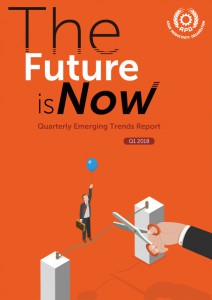
Select Page
 We live in volatile times. Disruptive technologies, changing demographics, evolving work models, political upheaval, and a protectionist stance toward global trade, as marked by the UK Brexit and the US pullout from the Trans-Pacific Partnership, have upended the status quo and left many feeling confused.
We live in volatile times. Disruptive technologies, changing demographics, evolving work models, political upheaval, and a protectionist stance toward global trade, as marked by the UK Brexit and the US pullout from the Trans-Pacific Partnership, have upended the status quo and left many feeling confused.
Worldwide, people are polarized by these trends. At one end of the spectrum, some are leaning toward these changes, championing them as steps in the right direction. At the other end, some feel disillusioned and discontented, with pervasive feelings of restlessness and uncertainty. Across the board, however, everyone seems eager to look for the “next big trend” that will guide them through uncharted territory.
To enable its member countries to grasp the changes and forces driving global trends, the Asian Productivity Organization (APO) is producing the quarterly emerging trends report, The Future is Now. The report attempts to distinguish underlying forces driving the shifts in time, technologies, and events and their possible impacts on productivity and competitiveness in APO member countries. Most people think that trends are the future, an erroneous notion that causes many strategic foresight efforts to fail because, while trends are visible because they are occurring right now, they may not represent the future.
The inaugural APO quarterly emerging trends report provides a macro view of elements that will shape the world. It describes the rise of ubiquitous, pervasive supercomputing, undergirded by the IoT and wireless mesh networks, that will provide exa (1018)-, zetta (1021)-, and yotta (1024)-scale computing power to analyze real-time big data and yield actual benefits to society. In tandem with quantum-computing technologies, the world will witness pervasive computing, not only in industries but also in markets where efficient allocation of resources can be achieved through use of big-data analytics.
The report also examines the rise of the hybrid production model, a unique integration of men and machines, that is expected to alter the way we produce goods. The role of humans will be in the form of “augmented humans,” in a world where idea generation as well as production planning and control functions will be initiated and expanded by both natural and machine intelligence. Flexible production, with adaptive changes reflecting customer preferences made whenever possible, will enhance process efficiency and product quality.
The APO quarterly emerging trends report acknowledges the plausibility of an avant-garde society and a sine-natio globe, making the notion of nation-states a thing of the past. Expanding on a US National Intelligence Council report predicting scenarios for a generation from now, enclaves known as “para-states” could operate under their own modes of governance based on function with selective outsourcing, potentially sounding the death knell for nation-states and paving the way for a world without nations (“sine-natio”). These and other developments will clearly have myriad implications for the future of all economies.